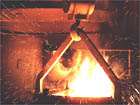LTV Steel assets sold
Investment firm to reopen mills; could prompt consolidation, labor deals.
February 27, 2002: 10:27 a.m. ET
|
 NEW YORK (CNN/Money) - New York investment firm W.L. Ross & Co. agreed to buy the steelmaking assets of bankrupt LTV Corp. for $125 million in cash and $200 million in assumed liabilities, the company announced Wednesday.
NEW YORK (CNN/Money) - New York investment firm W.L. Ross & Co. agreed to buy the steelmaking assets of bankrupt LTV Corp. for $125 million in cash and $200 million in assumed liabilities, the company announced Wednesday.
As part of the deal Ross has negotiated a new, lower-cost labor agreement with the United Steelworkers union that calls for many of the union members to be rehired but allows the company's new owners to shed the expensive retiree health-care costs.
The deal includes a $4 million breakup fee for Ross if it does not eventually win the bid. It is backed by both the company and the United Steelworkers union, and is subject to acceptance of the bid at an auction that will be conducted Wednesday and approval by the U.S. Bankruptcy Court, which is set to consider the auction results Thursday. Other interested bidders for LTV reportedly include United States Steel Corp. (X: up $0.55 to $18.79, Research, Estimates), the nation's largest steelmaker, and Cleveland Steel Inc., a recently formed company made up of former LTV executives.
The LTV deal could set the stage for a number of other steel asset sales, restructuring the industry's costs by shedding retiree health-care expenses.

|
|
|
LTV Steel agreed to a bid by New York investment firm W.L. Ross & Co. for its assets, including this Cleveland steel mill. | |
An estimated half of the U.S. steelmaking capacity, including that of No. 3 steelmaker Bethlehem Steel Corp., is owned by companies under bankruptcy court protections. Bethlehem and many other troubled steelmakers have confirmed they are in talks about possible consolidation of the U.S. industry.
Ross said it has hired Rodney Mott, a veteran of both U.S. Steel and nonunion steelmaker Nucor Corp. (NUE: Research, Estimates) as its new president and CEO.
The union, which called Ross "a new ally in the fight to win strong federal action to save the American steel industry," has virtually given up efforts to have the companies retain the retiree health-care cost obligation. Instead, it is pushing for legislation that would lead to federal assumption of those costs. Ross has agreed to lobby for that legislation as well.
The union and U.S. companies also are pushing for trade sanctions to limit steel imports. The Bush administration is weighing whether to impose such sanctions. The administration has a week left to decide on the proposed tariffs, which could add 40 percent to the cost of imported steel.
The union said Friday that the trust fund that has paid for part or all of retired LTV steelworkers' health-care and life insurance benefits since June 2001 is about to stop making those payments, and that the benefits will end March 31.
"Sooner or later, the same day will come for retirees at every steel company in the United States unless our government acts quickly and decisively to end unfair trade in steel, grant maximum tariff relief to give the industry time to recover from the damage caused by illegal imports, and level the playing field with relief for the industry's legacy costs," USW President Leo Gerard said the day the end of those benefits was announced.
The union was left in the difficult position of backing a buyer that was going to walk away from the retiree health-care costs in an effort to reopen as many of LTV's steel mills as possible. The Wall Street Journal reported Tuesday, quoting unnamed people close to the process, that U.S. Steel hadn't committed to operating all of LTV's plants. U.S. Steel would confirm only that it had submitted a bid to LTV, but declined to give details of its plans, the paper said.
Click here for a look at metals stocks
LTV Steel has steel mills in Cleveland, East Chicago, Ind., and Hennepin, Ill. It laid off most of its employees and put the plants on "hot idle" in December, which basically shut operations but kept some equipment, such as blast furnaces, in a state of partial operation so that restarting would not require major capital expenditures. 
|
| SPECIAL: |
|
|
|
|
|

|

